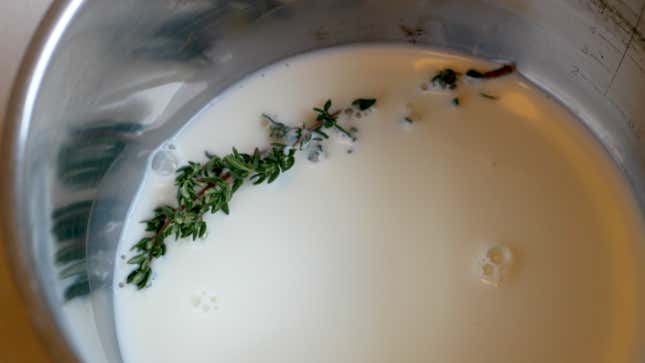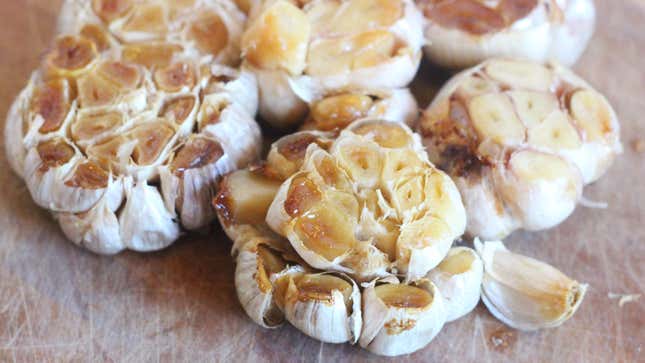I take mashed potatoes very seriously, and I can’t imagine Thanksgiving without them. Over the years, I have developed several recipes, methods, and hacks for making the creamiest, dreamiest, most flavorful mashers around. I start with a pretty standard base recipe, which you can find below. As with any dish with few ingredients, the secret to making good mashed potatoes lies in the details. Here are nine ways I make a better bowl of mash, no matter which recipe you use.
The basics
Table of Contents
There are certain steps you should take every time you make a mash, to ensure they your potatoes come out fluffy, creamy, and infused with flavor.
Choose a potato that reflects your preferences
Yukon golds are a low-starch potato, making them the potato to use if you value a denser, creamier mash. If it’s fluff you’re after, the starchier russet is the spud for you. I like combining a fluffy russet with a waxy Yukon, ricing only the Yukon and mashing the other spud by hand. This gives you the best of both worlds: the potatoes are creamy and luscious (thanks to the Yukons), but also fluffy (thanks to the russets). To keep your potatoes separate while they cook—without using two pots—use a small sheet pan as a divider in a big pot.
Dry ‘em out a bit
Once your potatoes are cooked and drained, but before you add any other ingredients, let them have a moment in the hot pot so the excess water can evaporate. This prevents your mash from being watery, and readies the potatoes to accept cream or other dairy into their being.
Infuse the dairy

Herb-flavored potatoes are great, but potatoes with discernible bits of raw herb that get stuck in your teeth are less great (unless those green bits are fried; fried herbs rule). If a smooth but flavorful mash is your priority, your best course of action is gently heat your favorite herbs in your milk (or buttermilk) to infuse it with flavor before adding it to the mash.
Add mayonnaise
If I’ve said it once, I’ve said it at least 11 times, but adding mayo to your mash is my number-one potato hack. You don’t need a lot—just a couple of tablespoons. The mayo doesn’t add any flavor, but it acts as an emulsifier, marrying moisture and fat for the creamiest, most luscious bowl of mashed potatoes you’ve ever eaten.
Never use a food processor
Fast moving blades are the death of the mash, as they obliterate the starch molecules, turning your mash into a pile of glue-like glop. If you crave smooth taters with no lumps, use a ricer, a stand mixer, or a standard potato masher (with a really strong arm).
Finishes and flourishes

If you want to level up, and make mashers that wow, consider implementing one (or more) of these spud strategies.
Add MSG
Just a tiny bit of monosodium glutamate adds a pure hit of savory goodness that just makes things taste better. Use a light hand, however—you want it to enhance, not distract. Too much MSG can overpower other flavors (and your palate), so add small pinches until you reach your desired level of umami.
Add a whole lot of jarred onion dip
Listen to me and listen good: I am not talking about homemade onion dip. I am talking about a room-temperature jar of the beige, jiggly stuff. All you need is 1/2 cup of dip and 1/2 cup of butter for every 2 pounds of potatoes. (That’s it. No heavy cream or any other dairy.)
Like mayo, store-bought onion dip is a great emulsifier but, unlike mayo, it brings flavor—creamy, savory, oniony flavor. Somehow, the dip manages to be subtle. No one will taste these potatoes and shout “Hey, you put onion dip in these!” They will take a bite, pause, and ask for your secret ingredient. But you’ll never tell.
Mash some roasted garlic in there
I’m a big fan of roasted garlic at the Thanksgiving table. I like giving everyone their own little bulb to spread on their rolls or smear on their turkey, but I also like to take the initiative and smash a whole bunch into the potatoes. Unlike raw garlic (which you should never add to your mash), or even sautéed garlic, roasted garlic melts right into the spuds, spreading its deeply sweet flavor throughout the mash.
Top with crunchy bits
Nothing “finishes” a dish quite like crunchy stuff, and there is no reason green beans should have all the fun. Thanksgiving is a meal that can always benefit from more textural contrast, and topping your mash with garlic chips, fried turkey skin, bacon fat sage leaves, or even French’s fried onions will make that contrast stand out. Plus, it just looks fancier. And we deserve to be a little fancy.
Ingredients:
- 2 pounds of potatoes, either all Russets or a 50/50 mix of Russets and Yukon Golds
- 1/2 cup whole milk
- 1/4 cup of salted butter, at room temperature
- 2-3 tablespoons mayonnaise (optional)
- A couple of sprigs of fresh herbs, such as thyme or rosemary
- Optional: MSG, roasted garlic, fried alliums for finishing (If you want to make onion dip mashed potatoes, use this recipe.)
Bring a large pot of very salted water to boil, and add two pounds of washed and peeled potatoes that have been cut into fairly uniform, approximately 1-inch chunks. While the potatoes are cooking, heat your milk (with herbs or without) over low heat, stirring occasionally so a skin doesn’t form. Let the potatoes boil until a thin knife can pierce a chunk with barely any effort on your part, then drain the water off in a colander.
Reduce the heat to medium-low, and return the potatoes to the pot, stirring them around for a few minutes to drive off excess water. Give the potatoes a few mashes with a potato masher (or use a ricer for waxy potatoes). If you’re using roasted garlic, add it with the potatoes. Add your warm milk, butter, and mayo (if using). Stir with a wooden spoon until just combined, being careful not to overwork the potatoes and their starches. Taste, season with salt, pepper, and MSG if needed, and finish with crunchy bits if desired.
